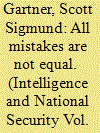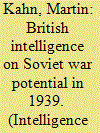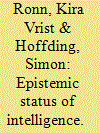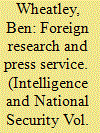| Srl | Item |
| 1 |
ID:
124117


|
|
|
|
|
| Publication |
2013.
|
| Summary/Abstract |
Strategic situations create motivational biases that help to predict the type of errors intelligence communities are more likely to commit (Type I errors predict behavior never observed, while Type II errors fail to predict behavior later observed). When the dangers of inaction are low and the cost of action high, the intelligence community is more likely to fail to predict threats (Type II error). If the dangers of inaction are high and the costs of military action low, it is more likely to predict mistakenly threats never observed (Type I error). Studies of US and Israeli decision-making and analyses of two new experimental studies support this theory. The key is to recognize the incentives for error and to develop systems that, at worst, lead to intelligence errors (mistakes consistent with a state's national security needs) and not intelligence failures (errors contrary to national security requirements).
|
|
|
|
|
|
|
|
|
|
|
|
|
|
|
|
| 2 |
ID:
124122


|
|
|
|
|
| Publication |
2013.
|
| Summary/Abstract |
The British government tried to create a peace front against German aggression in 1939 and the inclusion of the Soviet Union was controversial. This article investigates British intelligence on Soviet war potential in 1939 with the aim of comparing intelligence to reality, placing intelligence in context by following the British government discussion, commenting on earlier research about British intelligence on Soviet war potential and trying to find explanations for the fact that intelligence was far from reality. British assessments were of importance and earlier research is amended.
|
|
|
|
|
|
|
|
|
|
|
|
|
|
|
|
| 3 |
ID:
124121


|
|
|
|
|
| Publication |
2013.
|
| Summary/Abstract |
We argue that the majority of intelligence definitions fail to recognize that the normative epistemic status of intelligence is knowledge and not an inferior alternative. We refute the counter-arguments that intelligence ought not to be seen as knowledge because of 1) its action-oriented scope and 2) its future-oriented content. We dismiss the traditional infallibilistic understanding of knowledge and follow David Lewis' argument, that knowledge is fallible and context-sensitive. Thus, we argue for the importance of developing a methodology by which the entitlement, justification and robustness of claims to intelligence-knowledge can be assessed.
|
|
|
|
|
|
|
|
|
|
|
|
|
|
|
|
| 4 |
ID:
124118


|
|
|
|
|
| Publication |
2013.
|
| Summary/Abstract |
The article investigates how the Foreign Research and Press Service succeeded in overcoming internal government prejudice to become His Majesty's Government primary supplier of intelligence from the German-occupied Baltic states during the Second World War. As the Foreign Office had banned the covert intelligence agencies from operating within the Soviet sphere, which included the Baltic states, the non-covert Foreign Research and Press Service Baltic States Section could operate without offending the USSR. The article charts how the Foreign Research and Press Service supplied crucial information from the enemy press that helped to form British war and post-war policy towards the USSR.
|
|
|
|
|
|
|
|
|
|
|
|
|
|
|
|
| 5 |
ID:
124120


|
|
|
|
|
| Publication |
2013.
|
| Summary/Abstract |
Intelligence is widely misunderstood. Too much is made of secrecy, and of covert operations and counter-intelligence (action domains informed by intelligence rather than integral to it). Intelligence is often focused on threats, missing opportunities for advantage. A standard definition is proposed for better understanding of intelligence by the academy, media and public. Intelligence is a corporate capability to forecast change in time to do something about it. The capability involves foresight and insight, and is intended to identify impending change which may be positive, representing opportunity, or negative, representing threat. Definitions which converge with this proposal are found in several intelligence settings.
|
|
|
|
|
|
|
|
|
|
|
|
|
|
|
|
| 6 |
ID:
124115


|
|
|
|
|
| Publication |
2013.
|
| Summary/Abstract |
This article examines the activities of the Central Intelligence Agency (CIA) on the campus of the College of William and Mary in 1969 and 1970. Although the CIA operation at William and Mary was first revealed in 1980, it has not received any scholarly attention. The CIA compiled information on students and faculty who were perceived to be radical. The CIA utilized informants working in the Office of the Dean of Men. In gathering information about students and professors, CIA officials violated the law and undermined academic freedom. The surveillance serves as a reminder of how easily a secret agency can threaten civil liberties and demonstrates why Congress must be vigilant in its oversight of the intelligence establishment.
|
|
|
|
|
|
|
|
|
|
|
|
|
|
|
|